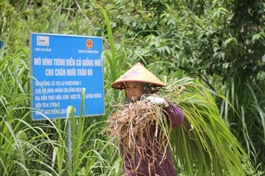VN agriculture needs modern processing industry
VN agriculture needs modern processing industry
Developing a modern processing and preservation industry is vital for the agricultural sector to increase the added value of farm produce and expand exports.

According to Nguyen Van Khoi from the Vietnam Academy of Science and Technology, post-harvest loss of agricultural produce remains huge, accounting for around 20-25 per cent or equivalent to 8.8 million tonnes per year, worth around US$3.9 million.
Viet Nam exports around $40 billion worth of agricultural products each year but mainly under raw forms because the existing processing and preservation system fails to meet the demand.
There were more than 10,000 enterprises operating in farm produce processing across the country, but most of them were small and medium-sized
A survey of the Institute of Policy and Strategy for Agriculture and Rural Development found that most farms' produce processing companies had outdated technologies, 73 per cent of workshops were temporary, and 40 per cent did not have professional qualifications, while only 1-5 per cent registered for product quality.
Dam Van Dua, director of Dong Cao General Services Cooperative in Me Linh District, Ha Noi, said that the cooperative wanted to build a cold storage system for the preservation and processing of agricultural products, but could not afford it due to high investment costs.
The need became pressing, especially in harvest season when a large volume of farm produces was collected, forcing farmers to sell at low prices due to the lack of processing and preservation facilities.
Bui Thi Hanh Hieu, director of Bao Minh Business Agricultural Products Processing Joint Stock Company, said that the Government should raise support policies in terms of capital and technology to encourage investment in processing and preservation.
According to Dao The Anh, Deputy Director of Viet Nam Academy of Agricultural Sciences, the development of cold storage system needed to follow planning to ensure appropriateness to each production area.
Deputy Minister of Agriculture and Rural Development Tran Thanh Nam said that the ministry would increase cooperation with localities to support new investment in and expansion of processing facilities of products with the qualified raw material areas.
The focus would be placed on building a production chain and promoting the development of enterprises and cooperatives operating in the farm produce preservation and processing industry.
The ministry would also focus on enhancing the farm produce processing quality and capacity with priority given to small and medium-sized enterprises and cooperatives to diversify products and increase added value, he said.
Potential
Nguyen Truong Thinh, deputy director of Luong Quoi Coconut Processing Company Limited, said that foreign markets had a high demand for product quality. Thus, advanced technology must be applied in preservation and processing.
Nguyen Thi Quy Phuong, director of QP Food Company, said that there were two clear trends in the production and consumption of processed foods in the global market. The first was that consumers had a stronger sense of responsibility for the environment, and the second was the strict requirement for the quality and origin of products.
Experts said that there was a lot of room to expand the export of agricultural products. It was vital to invest in preservation and processing to increase product quality and build brands.
According to the Viet Nam Trade Office in South America, countries tended to reshape the supply chain and diversify the supply of imported goods after the COVID-19 pandemic, providing significant opportunities for businesses in the agri-food industry. However, the opportunity would not come by itself if enterprises had no proactive change.
Nguyen Quoc Toan, Director of the Agro Processing and Market Development Authority, said that technology was becoming an important driver of economic growth and helping improve competitiveness and participation in the global value chain.
It was essential to improve the technical capacity of the farm produce preservation and processing to promote the development of the agricultural sector, Toan said.
Viet Nam aims to be in the top 10 processing centres of the world by 2030. There are currently 7,500 industrial-scale agro-forestry-fishery processing enterprises associated with exports and thousands of establishments of household processing nationwide.
The country was capable of processing and preserving about 120 million tonnes of agricultural, forestry and aquatic products each year. Over 95 per cent is done in small and medium-sized processing establishments.























